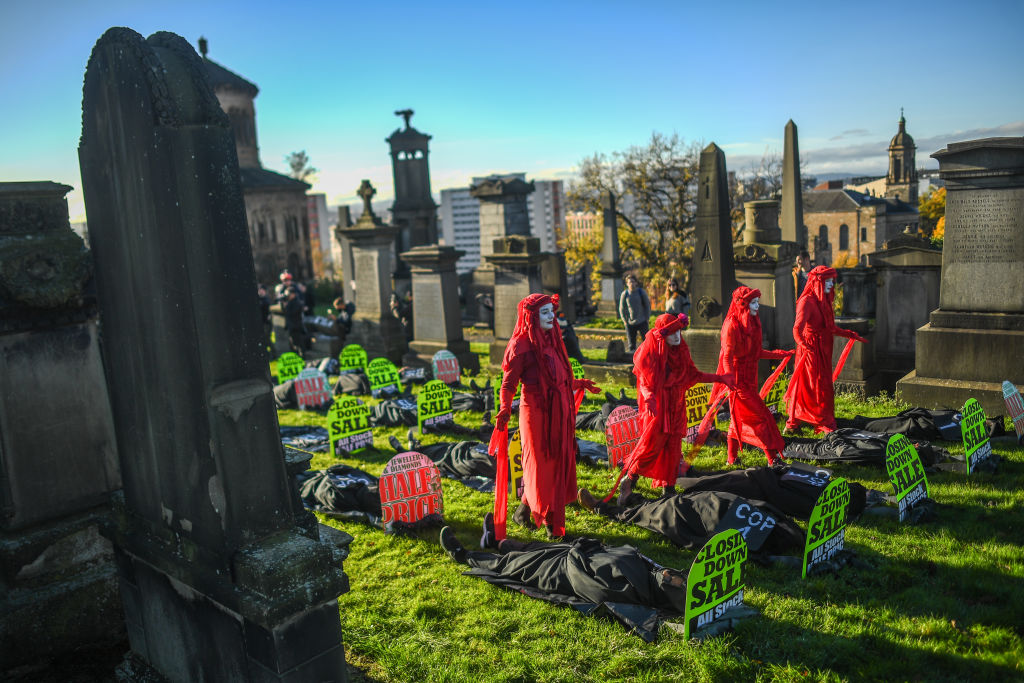The left’s polarising piety is its own worst enemy in the politics of climate

Throughout much of the English speaking world, climate change is a politically polarising issue. In the United States, Canada and Australia, the left favours action while the right opposes it. How lucky we are that this is not the case in Britain. Here, more than a decade of Conservative government has seen the introduction of some of the world’s most ambitious climate targets.
Here if anyone cries foul, it tends to be the left, who spy intransigence on the issue in the right-wing press. But a recent report, published by the usually dependable meteorologists at the Met Office, should remind leftist activists that they can be their own worst enemy too.
The forecast, named “UK’s Shared Socioeconomic Pathways”, was written by the Met Office, the Universities of Edinburgh and Exeter and the consultancy Cambridge Economics. It presents five allegedly “plausible” scenarios for the trajectory of the UK’s twenty-first century. For each, it sets out the “challenges” they represent to climate action.
Only in the first scenario, titled “Sustainability”, are we treated to a positive outcome for the climate. In the process, we discover that the necessary condition for reversing climate change is a hard-left utopia, which will sound distinctly dystopian to the rest of us.
The initial steps are relatively innocuous as the revolution builds up pace. In the run up to 2040, society “becomes more egalitarian”. In the years after, however, a “positive collaboration environment” begins to “dominate economic and societal development.”
Following this somewhat sinister, Soviet-style jargon, the authors hit their stride. Soon, “privately held vehicles no longer exist.” Property, after all, is theft. “Poverty is eliminated”, though it is unclear what measures, beyond wishful thinking, achieve this. The piece de resistance, however, is a perfect pastiche of remoaner piety. Between 2070 and 2100, the UK, triumphantly, “re-enters a progressive and expanded EU.”
With this utopia dispatched, the four remaining scenarios set out ways in which anything but Marxism damns the nation. In each, the combined powers of the populist right, evil business and incalcitrant individuals set us on a path to destruction.
In one, labelled “Regional Rivalry”, a “right-wing England” leads Britain into what sounds awfully like the middle ages. First, by 2050, the NHS has collapsed. Ten years later, government itself has collapsed. Finally, just fifty years from now, “military groups (militias, criminal groups, etc.)” rise to “de facto power”.
In all the scenarios, businesses are a negative force. In one relatively constrained version of our future, the “UK has transitioned predominanty into a gig economy” as early as 2040. In this vision, temporary jobs are common and large businesses hire independent workers for short-term commitments, often on poor employment contracts.
There is little regard here for whether it might actually be in the business communities’ interests to place all their staff on such perilous contracts. One can only imagine no business leaders were consulted in the process.
Individuals are considered suspect too. In the same scenario, the generation born in the 2010s are said to pursue, “individual lifestyles, leisure-based mindsets and opportunities for individuals to advance in business and technological competition.”
It is clear that we are supposed to frown on these horrid individualists. But all the things that make them such bad communists make them rather good little liberals.
To some of us, engaging in business and technological competition sounds like a good thing to do. For the sake of the climate, it is perhaps even essential.
It is, of course, easy to mock the fever dreams of left-wing academics and civil servants run wild. But there is a serious point to be made here too. The fact that attitudes to climate change are not tied to political proclivities in Britain is perhaps the single most important factor in believing we might be able to address it.
Unless we can decouple climate change from the political left or right, progress will move forward and backward with the political swing-o-meter. In this absurd study, the Met Office attempted to model the threats to action on climate change. In the process, they forgot the polarising piety of the left. One risk the Met Office failed to model was the politicisation of institutions – like the Met Office itself.
For all the latest Lifestyle News Click Here
For the latest news and updates, follow us on Google News.

